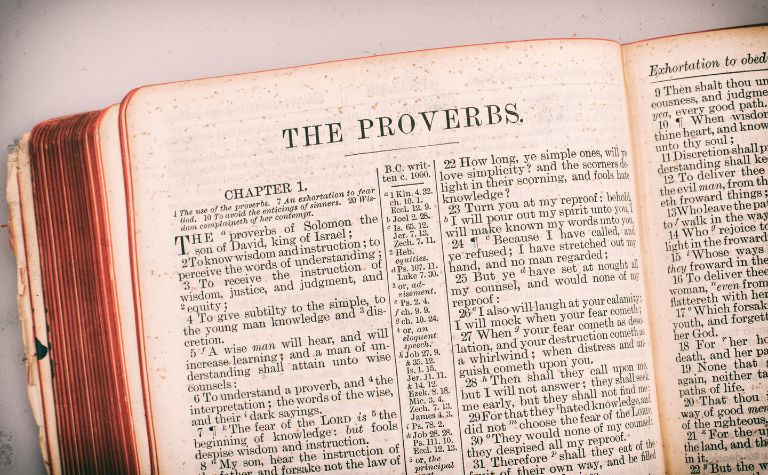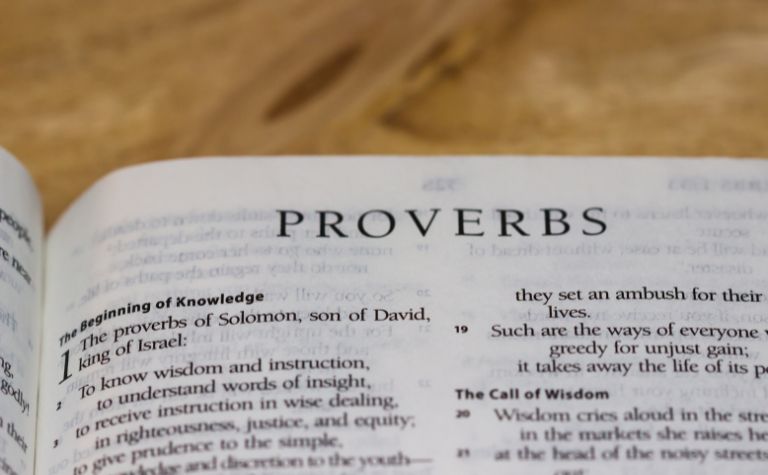The ancient Israelites valued wisdom that reflected the morality of the Law that God gave to Moses. Because of this, they loved the book of Proverbs, traditionally classified with Psalms and others, as part of the Wisdom Literature in the Old Testament. The book contains many sayings and short teachings designed to help readers live holy lives. Yet many people wonder who wrote Proverbs.
Solomon wrote most of the sayings in the book of Proverbs. However, one section consists of sayings attributed to Solomon that King Hezekiah collected. Also, Agur and Lemuel wrote the last two chapters of the book. Lastly, there is one nameless section referred to as the Sayings of the Wise.
Where does Proverbs say that Solomon wrote most of the book? Who was Solomon? What does the Bible say about him outside of Proverbs? Why did Hezekiah have a collection of Solomon’s sayings? Who were Agur and Lemuel? Keep reading to learn the answers to these questions and others.
Also, see Who Wrote Acts in the Bible? to learn more.

Solomon Wrote or Collected Most of Proverbs
The first verse of Proverbs attributes the book’s authorship to Solomon: “The proverbs of Solomon, son of David, king of Israel” (ESV). However, the byline only refers to chapters one through nine of the book.
The next byline, which appears in 10:1, also attributes the following section to him: “The proverbs of Solomon.” This section consists of 10:1-22:16. There are 31 total chapters in the book. (See below to learn what authors besides Solomon contributed to the book.)
Who was Solomon?
Solomon was the third king of Israel who ruled Israel from 971-931 B.C. He was David’s 10th son and the 2nd born to Bathsheba. In addition to his wisdom, Solomon is known for extensive building projects in Israel, including the temple (1 Kings 5-8).
Yet, no matter how wise he was, his family of origin, or how much money he had, Solomon wasn’t immune from temptation and sin.
Sadly, he is also known for having many wives and concubines. Solomon had 700 wives and 300 concubines. Some of his wives, given to him as the result of political alliances, were not Israelites and worshipped false gods.
This exposure negatively influenced him. The Bible reports that his wives “turned away his heart after other gods, and his heart was not wholly true to the Lord his God” (1 Kings 11:3-4).
Also, see Who Wrote Hebrews in the Bible? to learn more.

Hezekiah’s collection of Solomon’s sayings
Another byline occurs in Proverbs 25:1, “These also are proverbs of Solomon which the men of Hezekiah king of Judah copied” (ESV). This reference to authorship applies to chapters 25 to 29 of the book.
Proverbs expert, John Kitchen, explains: “Hezekiah reigned approximately 250-275 years after the time of Solomon. No doubt, it was during the spiritual revival under his reign (2 Kings 18:1-8; 2 Chron. 29:1-31:21) that King Hezekiah saw with fresh eyes the value of the wisdom God entrusted to Solomon and had his works reissued in the present form.” [1]
Who Besides Solomon Contributed to Proverbs?
The book of Proverbs includes one section that consists of a vague byline with no name and another two that have the names of authors about whom the Bible says very little.
The sayings of the wise
Proverbs 22:17-24:34 is traditionally known as “the sayings of the wise.” The name comes from the first verse of the section: “Incline your ear, and hear the words of the wise, and apply your heart to my knowledge” (22:17, emphasis added).
Where did the sayings in this section originate? Some scholars suggest they are Egyptian, but no one knows for sure. Others speculate that they might be included in the book because Solomon was the one who collected them.
Who are Agur and Lemuel?
Agur, the son of Jakeh, wrote Proverbs 30. His name means “gather together.” This verse is the only place that the Bible mentions Agur. Proverbs 31 starts, “The words of King Lemuel.” His name means “God with them.” This verse is the only place the Bible mentions Lemuel.
One scholar explains: “Nothing is known of Agur and Lemuel of Massa. It seems likely they were members of the northern Arabian tribe of Massa, one of the sons of Ishmael (Gen. 25:14; 1 Chron. 1:30). The records of their ‘council’ are further examples of the universality of wisdom traditions in the ancient world. They also give evidence of the international character of Israelite wisdom.” [2]
Also, see Who Wrote Revelation in the Bible? to learn more.

God gave Solomon wisdom
In the Bible, Solomon is known for his wisdom. The book of Proverbs illustrates his discerning heart and mind, but the narrative accounts of his life found elsewhere in the Old Testament do, too.
Solomon loved God and walked in his ways for much of his life (1 Kings 3:3). On one occasion, toward the beginning of his reign, while praying, he requested wisdom from God rather than asking for worldly possessions, power, or pleasures.
He said, “Give your servant therefore an understanding mind to govern your people, that I may discern between good and evil, for who is able to govern this your great people?” (1 Kings 3:9, ESV).
God was pleased that he asked for wisdom and not a long life, money, or victory over his enemies, so he answered his prayer. He even gave him more wisdom than anyone else: “Behold, I give you a wise and discerning mind, so that none like you has been before you and none like you shall arise after you” (1 Kings 3:12).
One verse indicates that Solomon knew 3,000 proverbs (1 Kings 4:32).
His wisdom was so profound that people all over the world sought his knowledge and advice: “Thus King Solomon excelled all the kings of the earth in riches and in wisdom. And the whole earth sought the presence of Solomon to hear his wisdom, which God had put into his mind” (1 Kings 10:23-24).
Also, see Who Wrote Romans in the Bible? to learn more.
References:
[1] Proverbs by John A. Kitchen. A Mentor Commentary. p. 561.
[2] A Survey of the Old Testament by Andrew Hill and John Walton. p. 443.
Related Questions
Regular Bible reading is a valuable habit, as Scripture is God's message to people. However, the Bible's 66 distinct books, featuring various authors, settings, and themes, can make it challenging...
There are 66 individual books in the Bible. There are 39 in the Old Testament and 27 in the New Testament. Many readers can read the shortest books in the Bible in 5 to 10 minutes. The longest book...
